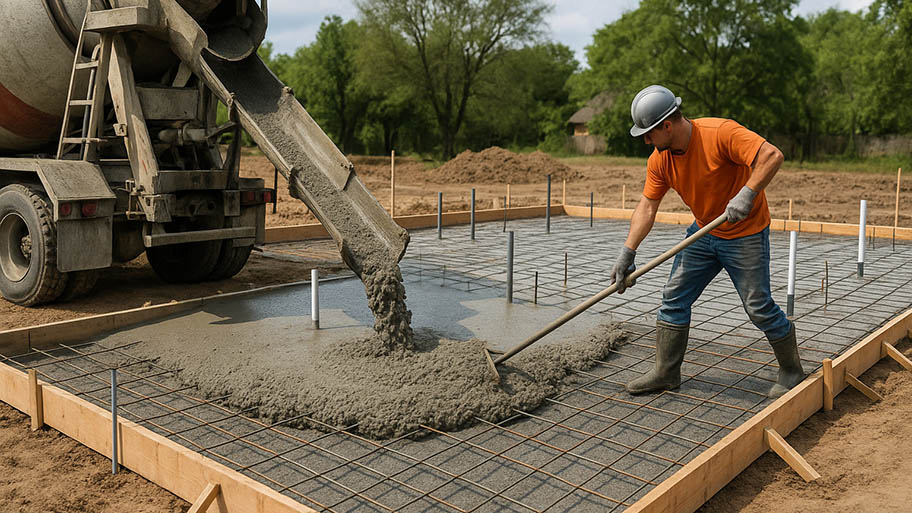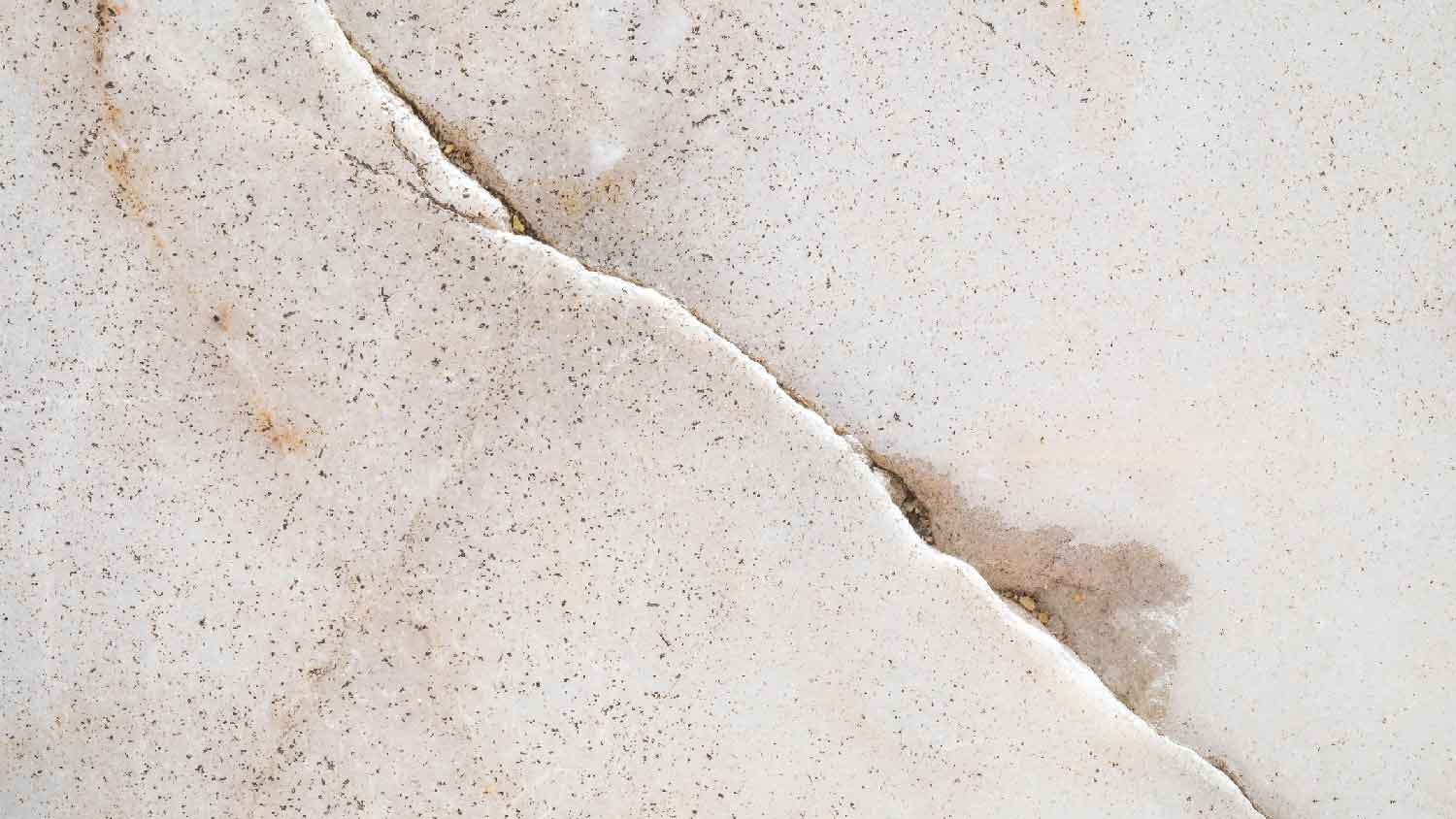
A foundation for a new-build home averages around $11,000. Find out all the factors that affect the cost of a foundation and how to save money.
Catch a slab leak before it’s too late


A slab leak occurs underneath a concrete foundation, and the average cost of repairs is $2,300.
Dark spots and water stains on your foundation slab, warm spots on a floor, cracks in walls, and high water bills are signs of a slab leak.
High water pressure, shifting ground, a poor foundation installation, or age can cause a slab leak.
You can prevent slab leaks by conducting regular inspections, maintaining your plumbing, and implementing strategic landscaping.
You may not give what your house sits on top of much thought—until there’s a problem. If you notice cracks in your walls or a mysterious sound of running water, you may have a slab leak on your hands. Read on for everything you need to know about what a slab leak is, and what to do if you suspect your home’s got one.
A slab leak refers to a leak that occurs underneath a concrete foundation. If left untreated, it can damage the foundation, floors, and walls of your home. But by keeping your eyes peeled for telltale signs of a slab leak, like cracks in your walls and unusual sounds, you can help protect your home’s foundation. When it comes to spotting a slab leak, here's what you need to know.

The clearest sign of a slab leak is a dark, damp spot on the top of your foundation slab. The spot will eventually present as a water stain and a musty smell, including other common signs of foundation water damage. Slab leaks may also appear around the perimeter of your foundation, such as when there are large spaces or signs of foundation heaving.
Slab leaks can eventually lead to cracks, faded flooring, and spots that are warm to the touch. In most cases, however, slab leaks will appear like a stain of dripping water with no discernible source.
There are a few common causes of slab leaks, including leaky or broken pipes and soil shift. Hiring a foundation repair contractor is the best way to get to the bottom of the issue.
Pipes buried underground are often subject to significant pressure. This pressure can increase if you experience an earthquake or if the ground underneath your foundation shifts. If a pipe is under too much pressure, it may burst and cause a slab leak.
Some plumbing materials are more susceptible to leaks. In particular, galvanized steel or cast iron pipes are vulnerable to corrosion. Other pipe materials, such as plastic, also suffer from abrasion as a result of small vibrations.
If the soil shifts underneath your home, it could cause a slab leak and damage your foundation. Soil that absorbs water and expands can damage pipes and contribute to leaks underneath your home.
While a slab leak can happen to any home, older homes are more susceptible to them. Because many older homes were built using materials and systems that are now outdated, slab leaks have a high chance of occurring.
Some older homes have copper pipes which are more prone to corrosion. And the water quality impacts the potential for slab leaks too, as water filtration systems have evolved over time. Older systems were less likely to purify the water, leaving minerals and calcium behind.
If the foundation was not properly installed, this could be cause for a future slab leak. While it’s hard to monitor whether builders are cutting corners with their work, you should do research on the best options possible when it comes to foundation repairs near you to avoid further headaches and unwanted puddles.
Address water damage as soon as it happens to prevent structural issues and mold growth. Hiring a pro for large leaks can save on more expensive repairs caused by prolonged water exposure.
If you have a leak in your roof or your basement, chances are you’ll notice it as soon as you step into the room. But if your home has a slab leak, it can be a little more difficult to detect. Here are some signs to look out for.
One common sign of a slab leak is a warm spot or spots on your floor. This could indicate that there’s a leak in your hot water pipe that’s causing a slab leak.
If you hear running water when no appliances in your house are using water, it could be a sign that a pipe has burst and is causing a slab leak. You may also hear a hissing sound from a smaller leak.
Over time, even a small slab leak can cause some serious damage to your home’s foundation, walls, and ceiling. While slab leaks aren’t the only cause of cracks in your walls or foundation, if you see any cracks in these locations, it could be a sign of a slab leak.
If your water bill is climbing even though your usage has remained steady, it could mean that there’s a burst pipe beneath your home. You should get in touch with a plumber near you to inspect your home.
Puddles or visible water damage like warped or moldy floors are other possible signs of a slab leak. These puddles often occur in areas near major plumbing components, like bathrooms and kitchens.
Neglecting to fix a slab leak might not seem like a big deal at first, but over time, it can cause major issues in your home.
Slab leaks that are left untreated—whether because they weren’t identified or were ignored— can cause cracks in walls and foundations, bad smells, low water pressure, and uneven floors. Not only are these uncomfortable conditions to live in, but the cost to repair the damage from a slab leak will only increase the longer it goes untreated.
Mitigate the chances of a slab leak by keeping a close eye on your plumbing, foundation, and landscape drainage. For example, since slab leaks often occur because of broken pipes, it's far more cost-effective to hire a plumber near you for an annual inspection. Clogged and worn pipes and high water pressure can all lead to problems.
Additionally, it's important to inspect your foundation regularly to check for the early signs of upheaval, cracks, or over-settling. Water damage is common when you have poor water management in your lawn, so maintaining proper landscape drainage is also key. More specifically, slab leak prevention tactics include:
Investigating early signs of a slab leak, such as water stains
Maintaining proper gutters and lawn drainage
Protecting the soil around the perimeter of your home with plantings
Keeping trees at least 10 feet from your home to avoid root damage
Keeping your water pressure in check to avoid burst pipes
Replacing pipes and main drains when damaged
Insulated pipes below your foundation to prevent runoff from condensation
It’s important to fix slab leaks right away, but it’s not a good fit for a DIY project. While you can learn how to fix foundation cracks, fixing a slab leak requires skills and experience the average homeowner doesn’t usually have. If you suspect a leak beneath your home, you should work with an experienced contractor who can check it out and recommend next steps. Depending on the size and location of the slab leak, you may need to reroute the leaky pipe or even repipe your entire house.
If a slab leak damages your foundation, it can hurt your home's structural integrity. Foundation slab leak repair costs around $2,300, while the cost of a new concrete slab is between $3,600 and $7,200. Costs depend on the size, thickness, and placement of the slab.
Additionally, the cause of the issue will determine whether a slab leak is covered by homeowners insurance. Keep in mind—slab leaks aren't the only cause of foundation damage. Other issues include expansive soil, frost heave, and varying foundation depths.
From average costs to expert advice, get all the answers you need to get your job done.

A foundation for a new-build home averages around $11,000. Find out all the factors that affect the cost of a foundation and how to save money.

Unstable or sinking foundations require comprehensive and expensive solutions. Learn about foundation underpinning costs in this guide to set your budget.

Foundation repair costs can be tricky when you have a large repair on your hands. This guide walks through costs from small cracks to total replacement.

Curious about the concrete under your home? Learn what a crawl space is, when this foundation style is appropriate, and how it compares to other options.

Concrete blocks and poured concrete are both common foundation materials. Learn the key differences between block and poured foundations.

Worried about pier and beam foundation repair costs? Get a better understanding of how to budget by learning about the repair methods available to you.